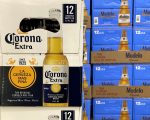
Shares of Lululemon plunged on Friday after the athletic apparel retailer issued disappointing guidance and said it’s seeing soft sales in the U.S., its largest market.
The retailer reported holiday earnings on Thursday evening that topped expectations, but showed that its growth in North America is stagnating.
Here’s how the company did in its fourth fiscal quarter compared with what Wall Street was anticipating, based on a survey of analysts by LSEG, formerly known as Refinitiv:
- Earnings per share: $5.29 vs. $5.00 expected
- Revenue: $3.21 billion vs. $3.19 billion expected
The company’s reported net income for the three-month period that ended Jan. 28 was $669.5 million, or $5.29 per share, compared with $119.8 million, or 94 cents per share, a year earlier.
Sales rose to $3.21 billion, up about 16% from $2.77 billion a year earlier.
Shares of Lululemon closed about 16% lower Friday. As of Friday’s close, shares are down about 21% this year, significantly underperforming the S&P 500, which is up about 10% in that time.
Like its peers, Lululemon has been grappling with uncertain demand and a slowdown in discretionary spending that’s hit the apparel space particularly hard. Investors have watched how Lululemon performs in North America, its largest region by sales, as it laps tougher prior year comparisons and contends with consumers who are choosing experiences over goods like clothes and shoes.
During the quarter, sales rose 9% in the Americas, compared to 29% growth in the year-ago period. While Lululemon is still growing in the region, the rate has slowed down significantly as Lululemon focuses on expanding internationally.
“As you’ve heard from others in our industry, there has been a shift in the U.S. consumer behavior of late and we’re navigating what has been a slower start to the year in this market,” CEO Calvin McDonald said on a call with analysts Thursday. “We view this as an opportunity to keep playing offense as we lean into investments that will continue our growth trajectory. Outside the U.S., our business remains strong.”
McDonald added that both traffic and conversions are down in the U.S. He attributed that to a lack of products in sizes zero to four, key sizes for the U.S. customer base, and not enough colorful items.
Meanwhile, international sales grew 54% on a reported basis, with sales in China growing 78% and 36% in the rest of Lululemon’s markets.
Comparable sales rose 12% during the quarter, just shy of the 12.3% uptick analysts had expected, according to StreetAccount.
For the current quarter, Lululemon expects net revenue to be between $2.18 billion and $2.20 billion, representing growth of 9% to 10%. Analysts were expecting a forecast of $2.25 billion, or growth of 12.5%, according to LSEG.
It expects diluted earnings per share to be between $2.35 and $2.40, below the $2.55 analysts had expected, according to LSEG.
For the full year, it expects sales to be between $10.7 billion and $10.8 billion, compared with estimates of $10.9 billion, according to LSEG.
It anticipates diluted earnings per share will be between $14 and $14.20 for the year, compared to estimates of $14.13, according to LSEG.
Lululemon has long been one of the market leaders for women’s athletic apparel, but the Vancouver-based company is facing more competition than ever. Newer entrants like Alo Yoga and Vuori have been nipping at Lululemon’s market share, and it’s had to work harder to set itself apart in the more crowded category.
The retailer has been working to build out its footwear offering and grow its men’s business. During the quarter, it opened its first men’s store in Beijing — a key growth market for the company. In February, it debuted its first men’s sneaker, CityVerse, and plans to launch new running styles for both men and women as performance sneakers continue to be a bright spot in an otherwise stagnant shoewear market.
Headed into the holidays, McDonald said Black Friday was the “single biggest day” in the company’s history and he was “encouraged” by the trends he was seeing at the start of the season. But the retailer’s holiday-quarter outlook came in a bit short of analysts’ expectations.
In January, it raised that guidance after it saw sales “balanced across channels, categories, and geographies,” finance chief Meghan Frank said in a news release.
Read the full earnings release here.







